
You are reading:

You are reading:
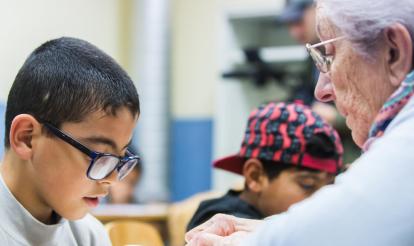
19.02.25
8 minutes readIn 2024, the ”la Caixa” Foundation assisted more than 235,000 beneficiaries in Spain and Portugal through its direct social intervention programmes, supporting people in vulnerable situations from childhood to later life. In 2025, the institution’s overall budget reaches the historic figure of 655 million euros, and 60% of the investment will be allocated to further strengthen its social transformation programmes across all Spanish provinces, to contribute to creating a better world for everyone.
The fight against child poverty, the promotion of employment for vulnerable individuals, the encouragement of active ageing and the care of people with advanced illnesses are some of the challenges we face today as a society. These are also the lines of action to which the ”la Caixa” Foundation has a priority commitment within the social sphere.
To offer more opportunities to those who need them most, the Foundation implements the CaixaProinfancia programme, whose mission is to promote equal opportunities in childhood. Aimed at households with children and adolescents at risk of or suffering from exclusion, the programme assisted 65,845 minors and 41,849 families in 2024, thanks to the networking of 467 social entities.
In 2024, within the framework of CaixaProinfancia, the Family Spaces 0-3 were established as a socio-educational support initiative for early childhood. “The proposal arises from the need to extend support to families with children aged 0 to 3 along two very clear lines: social support, through the role of the social worker; and family support in the educational sphere, provided by an early years educator and activities addressing topics related to parenting,” explains Soledad García, an educational psychologist and early years educator at the Fundación de la Esperanza in Barcelona. Additionally, these spaces also serve as meeting points for families: “Nowadays, motherhood is increasingly solitary, but coming here makes it a bit more supportive.”
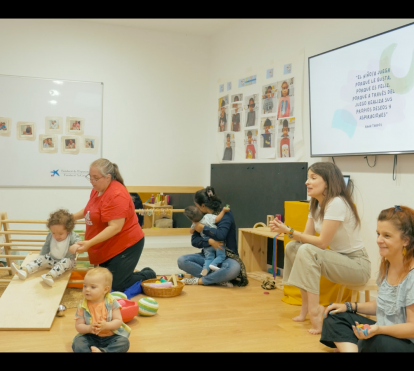
Although employment reached record levels in January, access to the labour market remains unequal. Certain groups face greater obstacles when it comes to finding a job.
To improve the social and labour integration of these vulnerable people, the Incorpora programme, through its guidance and job placement officers, designs personalised itineraries that assess each person’s potential, foster their autonomy and promote their participation to improve their employability.
When participants are ready to take the next step, various activities are organised, including job speed dating, a highly effective recruitment method for collaborating companies. The most recent event took place at CaixaForum Madrid in late 2024: “In one morning, the companies were able to meet several candidates, and each candidate attended up to four interviews,” explains Susana Moreno-Fernández, a corporate liaison at Hogar Sí, one of the social entities that coordinated the initiative.
And Incorpora’s work does not end with the interviews. When someone secures employment, the counsellors continue to provide support, offering follow-up and assistance based on individual needs: “I’m so nervous about the first day, where I have to go, who I have to ask for... In everything you can imagine that might arise in the process of joining a company, we’re here to support you,” explains Susana.
Thanks to the commitment of 411 social entities across the country and over 15,000 companies that embrace social responsibility, in 2024 Incorpora facilitated nearly 40,000 job placements in Spain.
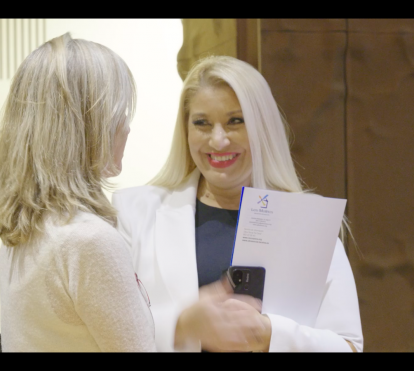
Another fundamental pillar of the organisation’s social action is end-of-life support, embodied in the Comprehensive Care Programme for People with Advanced Illnesses. In 2024, this initiative provided care to 36,587 patients and 41,682 family members across all Spanish provinces.
Xavier Gómez-Batiste, the programme’s scientific director, highlights that in the field of palliative care, beyond treatment for pain, it was recognised some time ago that “all aspects related to individuals’ psychosocial and spiritual needs – the meaning of life, the psychological aspects of adapting to illness, the social aspects of supporting families, etc. – were underdeveloped, and that this caused suffering”. In response, the ”la Caixa” Foundation launched this programme in 2009, focusing on providing comprehensive support to people with advanced illnesses and their families through 65 multidisciplinary psychosocial care teams (EAPS) and 176 home care teams.
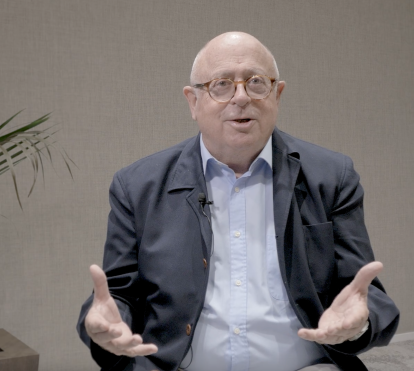
At the end of life, “many questions arise that are taboo in our society, but are very necessary to ask,” asserts the expert. For this reason, “it’s crucial to be clear that dying is a very common event; so common that it’s worth preparing ourselves well for it.” Social and cultural anthropologist Marta Morente agrees with Dr Gómez-Batiste, and emphasises that “addressing spirituality helps a lot, not only to experience death with greater peace or confidence, but also to live life.”
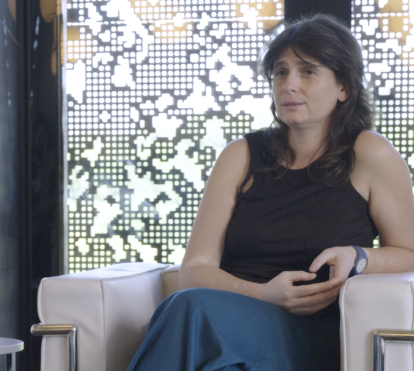
Ours is an ageing society: the number of older adults is growing all the time. However, in a society that uses youth as a benchmark, there is still a tendency to see old age as something negative which, although unavoidable, should be avoided. “Currently, around 50% of the Spanish population perceives that there is age discrimination towards people aged 55 and over,” says Vânia de la Fuente-Núñez, an international expert on healthy ageing and ageism. “Fortunately, I’ve seen and contributed to many global initiatives. And we’ve achieved unprecedented changes: 93 countries now have programmes and policies to address ageism, 105 have legislation to prohibit age discrimination, and the word ageism is now included in the Spanish dictionary, among other milestones,” notes De la Fuente-Núñez, who led the WHO’s global campaign against ageism.
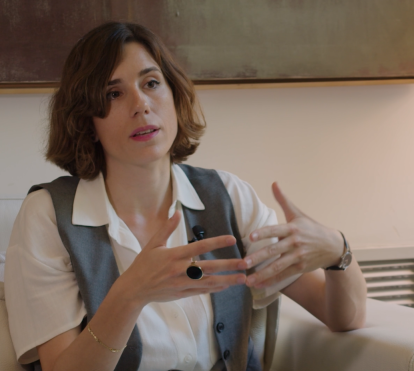
Supporting older adults has been a priority for the ”la Caixa” Foundation since its creation in 1904. In 2024, 533,080 individuals took part in the 18,417 activities organised by the programme for Older Adults across 635 centres in all provinces of Spain.
At the same time, the Always Supported programme, which supports older adults experiencing unwanted solitude, celebrated its tenth anniversary. A decade of fostering supportive relationships and well-being among older adults, empowering them and making them feel part of a society that is committed to them.
The Calls for Social Projects were also cause for celebration in 2024. They celebrated 25 years of history, a period in which a total of 23,518 projects have been led by social entities throughout Spain aimed at promoting equal opportunities and improving the quality of life for 10 million people in vulnerable situations.
Alongside the calls for proposals, which have evolved to meet the needs of the entities, the Spanish third sector has undergone a systemic transformation over the past quarter of a century. It has shifted from a primarily welfare-based role to a holistic approach, focused on the defence of rights and empowering people.
“Before, we used to attend to immediate and basic needs,” recalls Toni Bruel, general coordinator of the Spanish Red Cross (1994-2023) and collaborator in the Area of Relations with Social Entities of the ”la Caixa” Foundation. “Today, support is based on listening to people, getting to know their context and integrating them into personalised itineraries. The individual is no longer just a recipient of aid, but becomes an active participant in the process,” emphasises the humanitarian aid expert, who has witnessed these changes first-hand.
According to Bruel, this new approach has been organised around four pillars: “the pursuit of equal opportunities, comprehensive social and healthcare support, the promotion of personal autonomy and the creation of a diverse and inclusive society.”
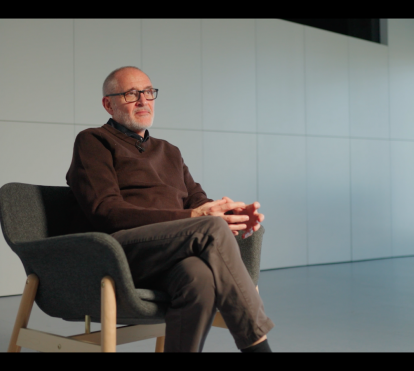
In response to the humanitarian emergency caused by the cold drop, in 2024 the ”la Caixa” Foundation also launched an aid plan for those affected in the hardest-hit areas. This plan had an initial allocation of over five million euros and included an extraordinary call for proposals that has already been resolved and has allocated more than 1.5 million euros to 81 initiatives from Valencian social organisations.
The plan as a whole is being implemented in two phases: the first, focused on emergency relief, and the second, on long-term recovery, providing both material and psychological support. To achieve this, the Foundation is working closely with key organisations such as the Spanish Red Cross, Cáritas, Save the Children, food banks, the Fundación Secretariado Gitano and Action Against Hunger.
The ”la Caixa” Foundation has also strengthened its strategic programmes across the region. Among these initiatives, support for children is the most sensitive. Through CaixaProinfancia and in collaboration with Save The Children, “safe spaces” have been set up as recreational areas that promote family well-being. Juan Miguel, a resident of Sedaví and father of three children aged four, nine and 11, emphasises their importance: “The youngest still asks me why the water did this. The middle one has been more emotionally affected, he seems worried. And the eldest has focused on studying and hasn’t opened up much yet. However, since they started coming to these spaces they’ve begun to relax, and at home they’re much happier.”
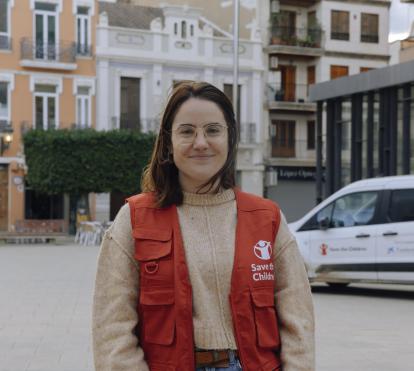
Maribel López del Castillo, head of emergency protection response at Save the Children, explains that through activities, expression and creativity, they work on helping the children manage their emotions “to identify what they’ve experienced and how they’ve experienced it, and to provide them with tools and resources. Most importantly, they need to feel that they have a space where people will listen to them and support them through this process.”